Summary 
Inventive black box production - a female title character plus Mark Anthony taking the lines of Caesar's wife, Calphurnia - with interesting insight into character and motivation. Effective modern drama eschews the inner struggle of Brutus for a visceral and bloody examination of inevitable revolution and its aftermath. A haunting Caesar roams the second act, observing in silence but marking all the victims of the civil war.
Design
Directed by Amanda Dehnert. Scenic design by Richard L. Hay. Costume design by Linda Roethke. Lighting design by Robert Peterson. Original music and sound design by Fabian Obispo. Fights by U. Jonathan Toppo.
Cast
Vilma Silva (Julius Caesar), Jonathan Haugen (Brutus), Gregory Linington (Cassius), Danforth Comins (Mark Anthony), Anthony Heald (Cicero/Publius/Cinna/Pindarus), Kenajuan Bentley (Flavius/Trebonius/Octavius), Kevin Kenerly (Casca/Lepidus/Massala), Ako (Soothsayer /Caius Ligarius/Volumnia), Brooke Parks (Marullus/Decius Brutus/Titinius), Gina Daniels (Cinna/Portia/Cato), Frankie J. Alvarez (Lucius/Metellus Cimber).
Analysis
Amanda Dehnert directs a small ensemble cast in Julius Caesar upon a small square within the Oregon Shakespeare Festival's New Theatre, the audience claustrophobically close to the performers on all sides, with just four narrow entrances between rising seats. The production features an intentionally handmade look, from the sparse setting and glaring white lights to the mostly modern, slightly military dark-clothing design. The courtyard outside the New Theatre, as well as the downstairs space, the stairs, and the upstairs lobby are lined with long narrow white banners, each featuring an assassination victim's face, with their name, year, and details - plus a quote - scrawled in block-letter black upon the white cloth. Subjects include familiar names from the 1960s like the Kennedys, Dr. Martin Luther King, Malcolm X, plus Abraham Lincoln - twice, once as "emancipator" and once as "tyrant" - as well Indira Gandhi, Che Guevara, Anwar Sadat, and Joan of Arc, and some perhaps lesser known names, such as Carlos Delgado Chelbaud of Venezuela, Benazir Bhutto of Pakistan, King Xerxes, and Thomas Sankara.
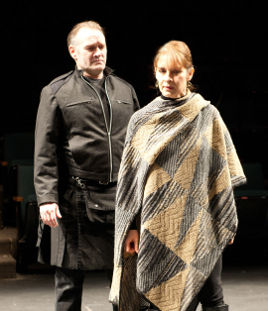
The banners and playing space give the location the feel of a political rally, and Dehnert furthers the feeling before the show begins, with her rabble-rousing cast members swarming the stage and in the front row with the audience. When Vilma Silva enters to deliver pre-curtain admonitions against cell phones and cellophane, she is attired as her character, Julius Caesar, and she encourages the audience to be loud and rowdy, and especially to react with roars and stomping feet - incited by the ensemble - when she raises her arms during the show's mob scenes. The production begins 1.2, with the ensemble in a modern combination of black denim and wool with military paraphernalia, and the lighting is stark white and glaring. The visuals may be black-and-white, but the morals and interplay are far murkier, with Vilma's strong-willed but attractive Caesar a more than typically empathetic target. She arrives amid orchestrated cheers, the house lights still up, a muted golden wrap over her black clothing, her arms upraised and her hair up. Tiny and feminine, but stern and forbidding, she is clearly a political power monger. She dismisses a tiny Chinese soothsayer with a cell phone - "beware the Ides of March" - and welcomes a swarm of photographers who angle for publicity shots.
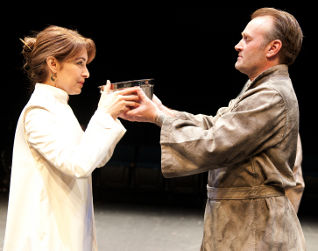
With Silva's Caesar so distinctly female, the hatred and political machinations of Gregory Linington's Cassius smack clearly of sexism, rather than with the text's blur of jealousy with patriotism. With blazing eyes, he stands tall and malevolent, embraced by Brutus but spewing venom - "we are underlings" - into his ear like Iago or one of Macbeth's witches. Jonathan Haugen's swaggering Brutus is more brooding soldier than conscience-torn politician, a no-nonsense tough-guy with slicked-back hair. They join Caesar, though Cassius is pointedly rebuffed so Anthony can be welcomed and invited to stand at Caesar's right hand. When the cast moves offstage, Cassius remains behind with Brutus, drawing his knife as they overhear Caesar repeatedly being implored to take the crown. An orange banner with white lettering - "REPENT" - hangs behind them.
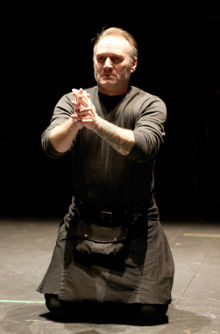
Dehnert moves quickly into 1.3, the approaching storm - and decision to assassinate a potential tyrant - approaching, as signaled by the ensemble pounding the stage for thunder and whipping hand-held spotlights through the audience to simulate lightning. They howl and make wind sound effects as well as eerie semi-musical tones in the near-darkness, some of them dashing across the stage from exit to exit in an effectively frightening chaos. Linington's almost feral Cassius is among them, shirtless and raging, as Brutus appears 2.1 and falls to his knees as the sound effects and swirling spotlights suddenly cease. His decision has already been made - think Macbeth with a better motive - Dehnert and Haugen focusing less on his indecision and temptation than on the violent results of his choice and how deeply saddened and tortured he becomes in the aftermath. With the arrival of the hooded conspirators, Haugen's Brutus is the voice of calm reason - "let us be sacrificers, not butchers" - and his coolness continues even during his impassioned moment with Portia, who slices a bloody wound into her own thigh.
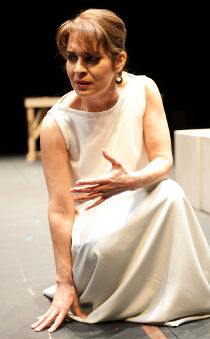
The intimate husband-and-wife moment is echoed in 2.2 not by Caesar and Calphurnia, but Caesar and Antony, as Dehnert chooses to completely cut Caesar's wife and give her lines to Anthony. The subtle implication is of at least a sexual relationship, as Danforth Comins' Anthony comforts Caesar as she awakes from a nightmare. Anthony's steadfast loyalty and impassioned defense of Caesar therefore becomes richer than sheer politics and a professional bond. Tall and commanding, with a knife in a scabbard secured to his chest by a shoulder holster, he listens to the positive interpretation of Caesar's nightmare, then sits to peel an orange as she is summoned.
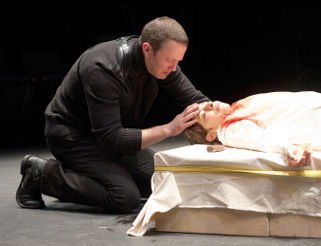
Dehnert cuts 2.3 and 2.4, propelling the story toward its first act climax in 3.1, as rough-sided wood blocks of furniture are stacked together under a white bed sheet to form a center stage platform. When Silva's Caesar arrives, the audience responds as instructed, erupting into wild applause, and the ensemble lead political chants. Caesar coldly denies a kneeling man mercy for his brother, again showing her reptilian toughness as the assassins gather around her. They conceal bloody sponges so their lunges and knife attacks result in graphic spurts of bright red blood. Brutus moves in slowly for the unkindest cut of all, blood already spattered across the white platform, and Caesar struggles for a moment before becoming silent and still. The assassins give an uneasy cry of, "tyranny is dead," and seem uncertain and confused, turning to Brutus for leadership. Despite Cassius' adamant objections, Comins' Anthony is allowed to safely approach, and he disarms himself, tears in his eyes as he kneels over Caesar. He embraces Brutus and makes a point to shake the bloody hand of each assassin, bloodying his own as they exit chanting. To an ominous rumble, he falls to his knees beside Silva's fallen Caesar, and he carves a spurting wound into the palm of his hand, then seems to consider suicide. But his anger rises - "cry havoc, and let slip the dogs of war" - as does Caesar, eerily and ghostlike in bloody white, and Anthony removes her rent jacket as she walks offstage.
Dehnert's second act is highlighted by the back-to-back 3.2 manipulations of the crowd, their fury redirected by skilled orators not once, but twice. The house lights remain up as the ensemble chants - "we will be satisfied!" - and takes seats to hear Brutus. As Haugen's Brutus begins, the lights are cut to a dramatic spot on him, but soon Caesar can be seen at the opposite side of the stage, emerging in an entrance in backlit white, a blood-spattered ghost. Haugen is dramatically effective but Comins is even moreso, enduring shouts of derision as his Anthony sets up a table and chairs - "friends, Romans, countrymen, lend me your ears" - moving into the audience to show patrons the stab marks and blood upon Caesar's jacket, then putting it gently over the shoulders of her ghost. Comins' Anthony, his voice at times breaking, works the audience and the ensemble, moving some of the latter to guilty tears, and he strides up and down the aisles, at times shouting, then dramatically leaps upon the table - "I am no orator as Brutus is" - to read Caesar's will in the most effective scene of the production.
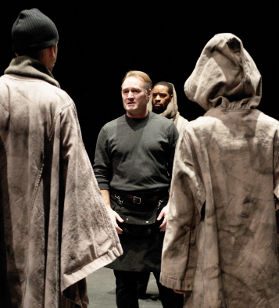
Dehnert follows with the 3.3 mob-beating of Cinna the Poet, as the unfortunately named poet arrives in a spotlight and is surrounded by violence-bent thugs wielding staffs and baseball bats. They muscle him offstage, and to the sounds of a vicious beating, Caesar's ghost moves onstage and peers as if to bear witness, then ghoulishly smears grayish-white makeup across the face of Cinna, transforming him into a ghost as well. Dehnert moves quickly, the most dramatic parts of her production concluded, driving through 4.1 and 4.2 with Anthony wielding a whiskey bottle in debate across a table from Octavius, who wears a long wool coat like a battlefield general. Dehnert's lights shift at the same table, blacking out on Anthony and Octavius and coming up on Brutus and Cassius, a poetic image as they confront each other from different sides of the same table. The 4.3 debate, Cassius in full battle gear and Brutus lying flat on his back as if wounded - "Portia is dead" - takes place with Silva's silent ghost circling slowly around them. After they use chalk on the table top to plan their military maneuvers, Brutus sits alone in candlelight, literally haunted by Silva's Caesar. When she blows out his candle, he relights it, but she snuffs it again as she passes by.
Shakespeare's Act 5 begins with the chorus chanting and stomping the stage with staff poles. They warily move into a circle to simulate the maneuvering armies, then spin to smack the poles against each other in a simulation of combat. Dehnert accompanies the fight choreography with pulsating red light and a score of loud and fast rock music, Silva's ghostly Caesar observing from the fringe. In 5.3, when Linington's wild-eyed Cassius moves Titinius into a suicide bargain, Caesar wipes their faces to mark them, and Cassius rises as a ghost to follow after Caesar. 5.4 slows the pace as black-hooded prisoners of war are brought before Octavius and Anthony, then forced to kneel. When Octavius executes them both with reverberatingly loud pistol shots to the back of the head, the future suddenly appears to be even more violent and despotic than it may have been with Caesar. The executed prisoners are smeared by Silva's Caesar, and they rise as ghosts to follow her offstage.
The concluding 5.5 is dramatically satisfying, with Haugen's Brutus dropping to his knees as he finds all the exits literally blocked with the ghosts of the battlefield dead. He slits his wrists, talking to himself, and the word "Mark" is separated from "Anthony" by the clattering of his knife as it falls to the stage. The ghosts move closer as somber music plays, and when he falls to his side, they all exit except Silva's Caesar. Anthony's arrival and final words - "he was the noblest Roman of them all" - concludes the play as Silva's Caesar finally finds peace, collapsing and dying onstage near Brutus.